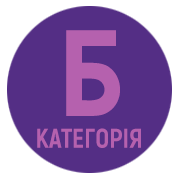INCLUSIVE CULTURE IN EDUCATIONAL SPACE: PROBLEMS AND PROSPECTS
DOI:
https://doi.org/10.32782/inclusion/2024.3.5Keywords:
inclusion; inclusive culture; educational space; participants in the educational process; educational processAbstract
The article examines the problem of forming an inclusive culture of participants in the educational process, as a basis for the success of the organization of inclusive education. The scientific and theoretical analysis of the literary sources proved a significant increase in the interest of scientists in inclusion and «inclusive culture» as an integral component of its successful implementation. The views of domestic scientists on the concept of «inclusive culture» were analyzed, its content was determined, and the necessity of its further development and formation of a humane attitude towards children with special educational needs in society was proved. Empirical research has proven the relationship between the level of formation of an inclusive culture and the involvement of participants in the educational process in relation to inclusion. The results of the study clearly prove the difference in views and levels of formation of an inclusive culture between students and parents who receive education in the conditions of inclusive education and in general conditions. The influence of the level of parents’ awareness of the specified problem and the level of formation of their inclusive culture on the formation of the inclusive culture of students and their contact with students with special educational needs has been proven. According to the results of the experiment, the main reasons for not accepting persons with disabilities or children with special educational needs for social interaction, which stand in the way of the development of an inclusive culture of participants in the educational process, have been identified. The main obstacles to the formation of an inclusive culture are defined as: low public awareness of the basic concepts of inclusion and the conditions for the implementation of inclusive education, which causes negativism or aggression among the parent team; existence of social stereotypes and prejudiced attitude towards persons with disabilities; insufficient level of educational work within the walls of general education institutions with participants in the educational process. Further avenues of research are planned in order to overcome the main obstacles in the formation of an inclusive culture of participants in the educational process.
References
Альохіна С. Сучасні тенденції розвитку інклюзивної освіти. Розвиток сучасної освіти: теорія, методика та практика. 2015. № 3. С. 10–15.
Боряк О., Дегтяренко Т. До питання інтеграції школярів із розладами аутистичного спектру в загальноосвітній навчальний простір. Педагогічні науки: теорія, історія, інноваційні технології. Сумський державний педагогічний ун-т ім. А.С. Макаренка ; Суми : СумДПУ ім. А.С. Макаренка, 2021. № 2 (106). С. 505–516. DOI: 10.24139/2312-5993/2021.02/505-516.
Бут Т., Ейнскоу М. Індекс інклюзії: розвиток навчання та участі в життєдіяльності шкіл. Київ: Плеяди, 2015. 190 с. URL: https://knowledge.org.ua/wp-content/uploads/2020/08/IndexForInclusion.pdf
Губарь О. Рівень сформованості інклюзивної культури суспільства в сучасних умовах. Освіта осіб з особливими потребами в умовах миру і війни : матеріали IХ міжнар. конгресу зі спеціальної педагогіки та психології. Київ, 2023. С. 117–121. URL: https://ispukr.org.ua/articles/23/2023%20%D0%97%D0%91%D0%86%D0%A0%D0%9D%D0%98%D0%9A%20%D0%A2%D0%95%D0%97.pdf
Деркачова О. Інклюзивні комікси як чинник формування інклюзивної культури. Українська мова і література в школі. 2020. № 6. С. 49–54.
Дмитрієва І., Іваненко А., Одинченко Л. (2022). Стратегії розвитку вищої освіти України в національному та світовому вимірі щодо професійної підготовки в контексті інклюзії. Науковий збірник «InterConf» , (131), 48–50. URL:https://archive.interconf.center/index.php/conference-proceeding/article/view/1579
Ередікс Н. Інклюзія в дії. URL: https://blog.brookespublishing.com/for-inclusive-schools-week-6-ways-to-createan-inclusive-culture-inside-and-outside-your-classroom/
Етичні правила спілкування з людьми з особливими потребами. URL: https://www.naiau.kiev.ua/news/etichni-pravila-spilkuvannya-z-lyudmi-z-osoblivimi-potrebami.html#:~:text=%D0%9E%D1%81%D0%BD%D0%BE%D0%B2%
Жилка О. Основні правила етичного спілкування з людьми з особливими потребами: година спілкування з елементами тренінгу для учнів 4-го класу. Дитина з особливими потребами. 2018. № 7 (43). С. 15–18.
Інклюзія. Форми роботи / упоряд. С. Дмитренко. Київ: Перше вересня, 2019. 200 с.
Картава Ю. Діти з особливими потребами у загальноосвітньому закладі: метод. реком Суми: СумДПУ імені АС Макаренка. 2012.
Миронова С. Педагогіка інклюзивної освіти: навчально-методичний посібник. Кам’янець-Подільський: Кам’янець-Подільський національний університет імені І. Огієнка, 2016. 164 с.
Пахомова Н. Теорія і практика професійної підготовки логопедів у ВНЗ: монографія. Полтава : ПНПУ імені В. Г. Короленка. 346 с.
Про Національну стратегію розвитку освіти в Україні на період до 2021 року : Указ Президента України № 344/2013 від 25.03.2013 р. URL: https://zakon.rada.gov.ua/laws/show/344/2013#Text
Про внесення змін до деяких законів України про освіту щодо організації інклюзивного навчання»: Закон України від 05.06.2014 р. № 1324-VII. URL: https://zakon.rada.gov.ua/laws/show/1324-18#Text
Про затвердження Порядку організації інклюзивного навчання у закладах загальної середньої освіти: Постанова Кабмін України від 15.09.2021 р. № 957 URL: https://zakon.rada.gov.ua/laws/show/957-2021-%D0%BF
Шеманов А., Єкушевська А. Формування інклюзивної культури при реалізації інклюзивної освіти: виклики і досягнення. Сучасна зарубіжна психологія. 2018. Т. 7 (1). С. 29–37. URL: https://www.researchgate.net/publication/325372864_Formation_of_inclusive_culture_in_the_implementation_of_inclusive_education_challenges_and_achievements DOI: 10.17759/jmfp.2018070103
Carrington S., Elkins J. Bridging the gap between inclusive policy and inclusive culture in secondary schools. Support for learning. 2002. Vol. 17 (2). P. 51–57. URL: https://core.ac.uk/download/pdf/10873852.pdf
Corbett J. Inclusive education and school culture. International Journal of Inclusive Education. 1999. Vol. 3 (1). P. 53–61. DOI: https://doi.org/10.1080/136031199285183
Denisova O., Lekhanova O., Ponikarova V., Gudina T. Inclusive culture of kindergarten, school, college and university teachers. SHS Web of Conferences. 2019. Vol. 70. DOI: https://doi.org/10.1051/shsconf/20197010002ICTDPP-2019
Schneider B. H., Woodburn S., del Toro M. D. P. S., Udvari S. J. Cultural and gender differences in the implications of competition for early adolescent friendship. Merrill-Palmer Quarterl. 2005. Vol. 51 (2). P. 163–191. URL: https://www.webofscience.com/wos/woscc/full-record/WOS:000231002000003 DOI: 10.1353/mpq.2005.0013







